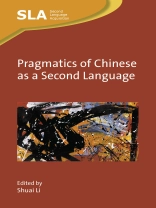This book brings together a collection of high-quality empirical studies which examine multiple aspects involved in the acquisition, teaching and assessment of pragmatics in Chinese as a second language (L2). The studies collectively address some of the most cutting-edge issues in the field of L2 pragmatics, such as the acquisition of key pragmatic features, methodological innovations in pragmatics assessment, individual difference factors and virtual learning contexts. The majority of the chapters include detailed descriptions of the instruments used and additional material in the appendices, making it a truly valuable collection for researchers and students alike. Furthermore, the publication includes the most comprehensive, state-of-the-art review of empirical research in L2 Chinese pragmatics published bilingually (in English and Chinese) between 1995 and 2022, along with a supplemental annotated bibliography. While the empirical studies all focus on Chinese as the target language, the issues they address have implications for L2 pragmatics research in general and this book will appeal to those interested in the latest developments in the field.
表中的内容
Contributors
Acknowledgments
Shuai Li: Introduction
Chapter 1. Shuai Li, Ting Wen and Yali Feng: Research on L2 Chinese Pragmatics (1995-2022): A State-of-the-Art Review
Part 1: Acquisition of Key Pragmatic Features
Chapter 2. Wenhao Diao and Chen Chen: ‘Softening the Tone?’: A Corpus-Based Study of the Utterance-Final Pragmatic Particle BA (吧) between L1 and L2 Chinese Speakers
Chapter 3. Li Jin: L2 Chinese Internet Slang Learning: Chinese as a Foreign Language Learners’ Knowledge and Motivation
Chapter 4. Mo Chen, Wenxin Zhang, Yazhuo Qiu and Chunyin Li: Effects of Proficiency and Situation Type on the Production of L2 Chinese Request Strategies by Japanese Learners
Part 2: Methodological Innovations for Pragmatics Assessment
Chapter 5. Tianyu (Sophie) Qin: Using a Slide Ruler to Assess Accuracy and Certainty in L2 Chinese Implicature Comprehension
Chapter 6. Qiong Li: An Exploratory Study on a Natural Language Processing Approach to Evaluating L2 Pragmatic Performance
Chapter 7. Shuai Li: Using the Rasch Model to Evaluate Instrument and Data Quality in Assessing Requests in L2 Chinese
Part 3: Individual Difference Factors in Pragmatics Acquisition
Chapter 8. Yunwen Su and Xiao Hu: Proficiency, Motivation and Production of Conventional Expressions in L2 Chinese
Chapter 9. Jia Yang: Learning Strategies for Pragmatic Routines by Learners of L2 Chinese
Part 4: Web-Based Approaches to Teaching and Learning Pragmatics
Chapter 10. Li Yang: Effects of Website-Delivered Instruction on Development of Pragmatic Awareness in L2 Chinese
Chapter 11. Xiaofei Tang: Is a Game More Appealing than an Online Lesson for L2 Pragmatics Learning?
Yali Feng and Shuai Li: Appendix: An Annotated Bibliography of Empirical Studies on L2 Chinese Pragmatics (1995-2022)
Index
关于作者
Dr. Shuai Li is Associate Professor of Chinese, Director of Undergraduate Studies, and Chinese Program Coordinator in the Department of World Languages and Cultures at Georgia State University. His research interests include acquisition of L2 Chinese and interlanguage pragmatics. He has published in Language Testing, Language Assessment Quarterly, Language Learning, The Modern Language Journal, Language Teaching, The Encyclopedia of Applied Linguistics, among others. Shuai served as the President of the Chinese Language Teachers Association – USA (2022-2023) and is the Co-President of the Georgia Chinese Language Educators (2022-2024). He is the Review Editor of Chinese as a Second Language.












